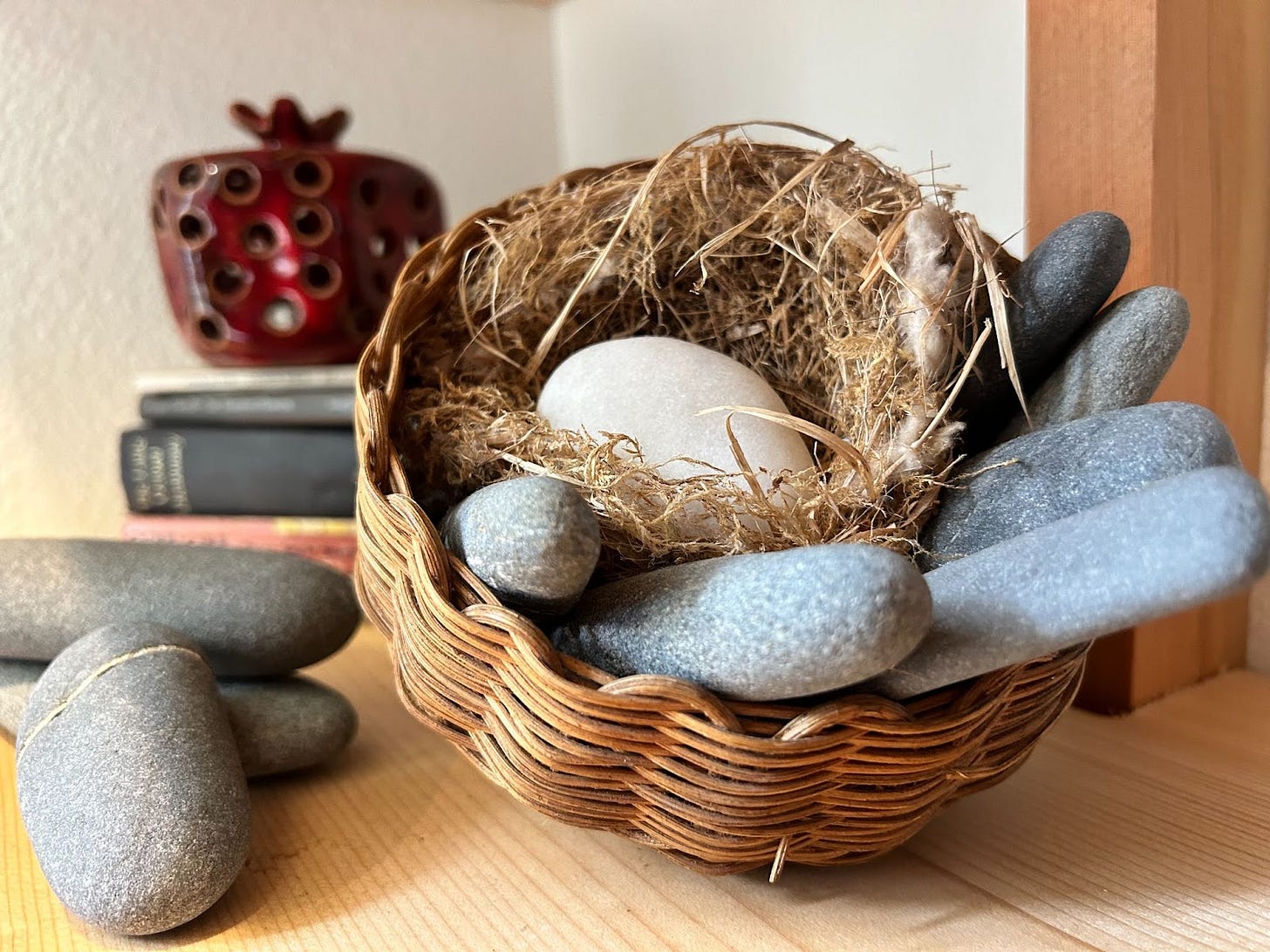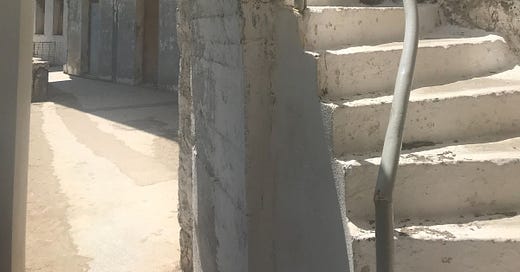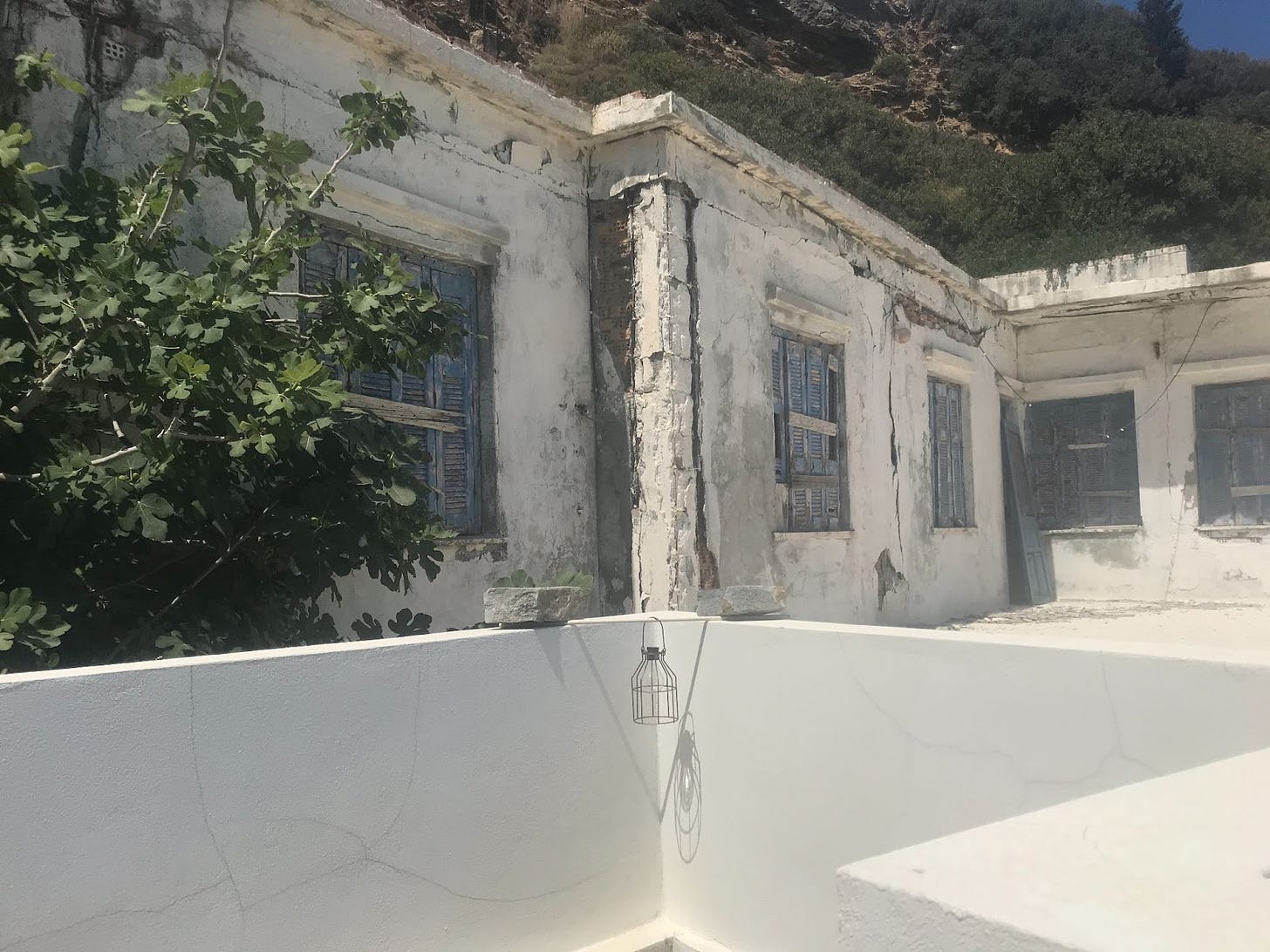This Week in Joyful Practice: Revisiting Spaciousness
and a prompt for working with constrictions and making space for enchantment
This week, I've been thinking about spaciousness, about spontaneous expressions of joy when it seems like everything has gone dark, about stealing time when time feels expensive and hard to come by.
When my sister died, there was the shock of it, the grief that squeezed us tight, and there were all the urgent tasks and phone calls and decisions to be made, and still the kids needed dinner and help with homework, and somehow we had to negotiate getting Lily’s body home, plan her rosary and funeral, buy the kids clothes to wear to their tia’s funeral. Doing anything felt like moving through glue. Everything from that weird stretch of time between Lily’s death and her funeral seems like it was outside of time. Grief, like physical pain or deep exhaustion, can make time go fuzzy. But then there were these moments my siblings and I shared where I felt a space opening up–the grief and shock were still present, but sudden bubbles of joy would erupt, and we’d laugh hysterically. Everything still felt awful and unbelievable, but these hits of connectedness became the tendons that held me together during those weeks. It was a tender and tenuous joy, this sibling togetherness when one of us was gone so suddenly and forever.
Yesterday, I walked through the backyard to my studio, feeling the pressure of students needs, essays that needed grading, my own writing waiting, waiting, and Crohn's flaring up again, making my belly feel on fire, my skin feel achy and bruised. The closer I got to my studio, the more dread pulled at my limbs: I’m so fucking tired. How am I gonna get anything done? Instead of walking into the studio and turning on the computer, I let myself get distracted by the garden–checking to see if any runner bean seedlings had emerged, touching the tiny nubs of the potato plants pushing through the soil, noticing what needed watering and what needed weeding. I spent maybe ten minutes walking through the garden getting my hands dirty, and in those ten minutes, I felt less exhausted, less achy, less dreadful. Heading into the studio, I still felt the pressure of everything that needed doing, but it felt more approachable.
In these moments when grief overwhelms, or when there are piles of work that need doing, and I make the decision to delay, step away, stay up too late laughing with a friend, or play in the garden, I feel a loosening in my chest, I feel my brow soften and my jaws relax. Choosing to walk away, just for a little bit, to make a tiny space for being present, for playing, even when grief feels heavy and work feels like too much, and my achy body is being my achy body, in these moments, I feel a spaciousness and that spaciousness feels like joy.
I’m remembering another post I wrote a little over two years ago, when Jenn and I were just getting started with the Scrap Heap. I’m going to share it again because I love the Sharon Blackie quote and the writing prompt at the end. I also love looking back and seeing the themes that have continued to develop over the past two years of writing this newsletter with Jenn. It's no surprise to me that I was writing about empty nesting and spaciousness, constrictions and making time for enchantment. Saturation Jobs, y’all.
Spaciousness
on constrictions and making space for enchantment

An early spring dream: I discover a secret door behind an abandoned van in a neighbor’s yard. When I open the door, I see stairs and a large window alcove. They’re covered in plaster and whitewashed, like the alley walls and steep steps in Therma, Ikaria, a small village on a small island in Greece, where I once followed a cat up a wide whitewashed staircase that led to an abandoned hotel—fig trees pushing through pane-less windows, door frames over run by oleander, rusted breaker boxes dangling above the Aegean.
The staircase I find myself on right now is not in Greece. It is in a place outside of place, a space that hovers on the other side of our homes and the confines of family needs and endless utility bills. I’m a little wary of what’s at the top of the stairs, but I know I will find something important. I leap across a narrow, deep gap between the stairs and the window alcove. There, in a large wooden bowl, I find a ribbon, rust red, with a small silver pomegranate tied to one fraying end.
I wake up thinking of Persephone and her mother who put the world to sleep, so she could grieve a daughter lost. When my daughter was young, I told the story of Persephone and Demeter as a coming of age adventure. In my version, Persephone chose to go to the underworld. It was time for her to understand her own potential, begin to know herself as a being separate from her mother. In order to grow, Persephone needed space from her mother, so she ate the seeds.
I have a tattoo of Demeter on my left arm for my son, Dimitri, and a tattoo of the three graces on my right arm for my daughter, Graciela. It's like holding my children, even as they grow into their adult lives. I became a mother before I knew what being an adult meant. I did not know how to separate the identity of mother from my understanding of myself.
In a few weeks, I’ll be 49. Now I have the space to go into my own underworld, to explore my own alcoves and staircases. This new spaciousness coincides with new constrictions. Actually, strictures in my terminal ileum, the end of the road for the small intestines. Crohn’s means my gut is always working overtime–there’s not much room for anything to move with all those strictures and all that inflammation. My body is often exhausted. As I type this, I can feel the symptoms of a flare-up haunting my joints and limbs. The familiarity of achiness rising bright like a flush.
Every night after dinner, my sweetie says to me, “Ready for our postprandial perambulation?” Twelve-year-old me groans and flips him off and thinks of reasons to get out of our nightly walk–I’m too tired and too achy. But my dietician wasn’t wrong. Walking after dinner helps ease the achiness. I’ve grown to love our new routine: my arm around my sweetie’s elbow, walking the same route every night, tracing the changes in plants, watching the critters who come out at dusk. Right now, the cherry trees are raging, and I stop at my favorite one to smell the fresh-corn-tortilla-sweetness of its blossoms. The other night, we saw a buck in someone’s yard, surrounded by four does. The spring peepers are out, too. When we reach the gully where they live, all conversation halts, and we listen to them croaking love songs into the night.
Sharon Blackie writes about smelling wild bluebells and listening to a crow caw. She says that when we stop to smell, stop to listen, we are making space in our bodies for the bluebell, the crow. They become us, and we become them. I believe her. We share the same air, the cherry blossoms and I, the peepers. When I take the smell of cherry blossoms into my body, I feel an expansion, like all of the inflamed places are sighing with relief. They can relax and make a little room for the peepers' croaks.
prompt
Our lives are filled with strictures–losses and grief, children and work, chronic illness and pain. How do you work with constrictions, creatively and in other areas of your life?
Spaciousness is not always about space. Small spaces can offer potential, like the seeds of a pomegranate or a sparrow’s eggs. How do you make room for spaciousness? For curiosity? For getting lost and discovering something enchanting, like a stairway that leads to an abandoned hotel where fig trees and oleander have taken up residence, or a buck in the middle of a suburban neighborhood surrounded by croaking peepers and cherry blossoms?






